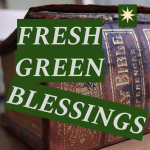
Jeremiah 14: 3-7, 20: …Nobles send their servants for water; they come to the cisterns, they find no water, they return with their vessels empty…because the ground is cracked. Because there has been no rain on the land the farmers are dismayed…Even the doe in the field forsakes her newborn fawn because there is no grass. The wild asses stand on the bare heights, they pant for air like jakals; their eyes fail because there is no herbage…our iniquities testify against us…We acknowledge…the iniquity of our ancestors.
∞∞∞∞∞∞∞∞
Water has been referred to as “the new oil,” a precious liquid commodity that people will monetize and fight and kill over. At the time of this writing (2019), it is common to hear reference to “the drought” in California, but a California friend says such statements are misnomers. “Drought” implies a temporary circumstance; the dryness of California is “the new normal.”
Verse 7 of Jeremiah 14 admits that “our iniquities testify against us.” The word “iniquity” is not part of our common parlance. One definition of “iniquity” is “grossly unfair behavior.” They find no water…the ground is cracked…the farmers are dismayed…the doe forsakes her fawn [because] there is no grass… There is no herbage…therefore, the panting wild asses are going blind. Where does responsibility fall for this famine and draught? Our iniquities – our grossly unfair behavior – testifies against us, along with the grossly unfair behavior of our ancestors. Humans are responsible. We may say it is “an act of God,” we may even plead with God to save us (as the author of Jeremiah 14 does), but it comes back to our iniquity, our grossly unfair behavior.
The interdependence of humans with other creatures is painfully highlighted in this reading. The wild asses are panting like jackals and going blind. The mother deer has failed in the mothering of her newborn. Surely, the baby fawn will die. And who is to blame for this iniquity? Jeremiah answers, We are, and our ancestors are, as well.
The depth of our interdependence can be painful, but it is also our source of worthy hope. Our human actions matter…and reverberate across the web of life.
∞∞∞∞∞∞∞∞
Our aspiration in Fresh Green Blessings is not to misappropriate Biblical texts, but to wisely re-appropriate them in beneficial ways. Just as it was helpful for the Exodus story of the Hebrew slaves to be re-appropriated and applied to the conditions of the African-American slaves, it is beneficial to open our hearts afresh to prophetic voices that cry out when the Earth and its creatures, including humanity, are suffering. “You shall say to them this word: Let my eyes run down with tears night and day, and let them not cease” (Jeremiah 14:17a). Yes. Let us begin with tears. Let us begin by opening our hearts and spirits to the dead and suffering animals, recognizing our accountability and responsibility for their pain. Can we let our eyes run down with tears for even five minutes? Can we cry for just a few minutes? Dare we?
We must begin.
(Music: Courtesy of Adrian Von Ziegler, “Circle of Life.” )